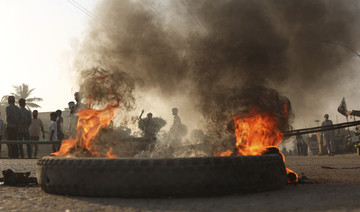ISLAMABAD: He has 55,000 followers on Twitter and thousands more offline.
However, those statistics alone are no measure of the popularity enjoyed by the Chief of Tehreek-e-Labbaik Pakistan (TLP) party, Khadim Hussain Rizvi.
With his flowy white beard, turbaned garb and fiery speeches, Rizvi catapulted to success after his far-right TLP emerged as the fifth “largest party in the vote count at the national level and the third largest in Punjab”. This was according to an exit poll conducted by Gallup International’s affiliate in Pakistan which reported that the TLP had staked claim to four per cent of the total vote bank in the general elections conducted in July this year.
The past three days have been a testament to his popularity as Rizvi continues to dominate screen space on major TV channels after fomenting his party workers and supporters to protest against the Supreme Court’s decision to acquit a Christian woman on death row. The demonstrations, which began on Wednesday, have choked and paralyzed major cities of the country.
Rizvi, born in 1966 in a small town of Pindi Gheb -- located in the Attock district of the Punjab province -- used to deliver the Friday sermons at a mosque near the largest Sufi shrine of Data Darbar, in the eastern city of Lahore. He worked at the Awqaf and Religious Affairs Department of the province until he was removed from the post for his failure to curb speeches riddled with hate.
He became wheelchair-bound after serious injuries impaired his leg movement which he had incurred during a road accident in 2006. Rizvi is often credited with attempting to resurrect the Barelvi sectarian identity in Pakistan by actively working against any individual who commits or is accused of commiting blasphemy. According to estimates, Barelvis are considered the major school of thought in Pakistan, which emphasizes on a personal devotion to Prophet Muhammad (PBUH) and fuses Islamic law with Sufism by honoring its saints.
Members of the sect have often been targeted, and their shrines bombed, in a string of attacks by militants who reject the ideology and seek to contain its spread.
The foul-mouthed preacher shot to prominence last year after staging country-wide demonstrations, which took a turn for the worse, over a call to amend the text of the Khatm-e-Nubuwwat (Finality of Prophethood) in the Election Act Bill 2017. The government succumbed to the demands of the protestors after the military intervened and brokered a deal between the two parties.
However, Rizvi’s cause gained further momentum shortly after Mumtaz Qadri, an elite police commando tasked to protect former-Punjab Governor Salman Taseer killed him at an upscale market in Islamabad in December 2011. The Barelvi disciple justified Qadri’s actions because the governor was supporting Bibi at the time.
Qadri was apprehended and sentenced to death but Rizvi capitalized on the assassination, hailing the commando as a hero of Islam and spearheading a movement in Qadri’s name, going as far as to advocate for his release. It was an exercise in futility and Qadri was executed by the state in 2016.
Moreover, the TLP party was formed as a political front for the Tehreek-e-Labbaik Ya Rasool Allah in 2015 -- its next sensible step towards utilizing and legitimizing the street power it enjoyed. Rizvi by that time had gathered enough support to become an influential Islamic figure, capable of moving masses. At Qadri’s funeral, Rizvi was able to lure a crowd of more than 100,000. That number, however, is insignificant when compared to the huge number of followers he has today.
The TLP’s ability to bag more than 2.2 million votes, which is roughly 300,000 less than its heavy-weight rival Muttahida Majlis-e-Amal – a five-party alliance comprising religious and veteran politicians -- “has surprised many”, according to the Gallup survey results. Except for the ruling Pakistan Tehreek-e-Insaaf (PTI) and opposition party Pakistan Muslim League – Nawaz (PML-N), the TLP crushed all other contesting parties in Punjab. This was notable when compared to Prime Minister Imran Khan’s PTI which led with 32 per cent of the votes in the polls, according to the Election Commission of Pakistan. The PML-N, on the other hand, ranked second with 24 per cent of the votes.
“Anecdotal evidence based on the General Election 2018 constituency results showed that on many seats, the TLP vote pushed PML-N to a second position and thereby is put forward as one reason for loss of PML-N seats,” the survey suggested.
It adds that “another way to look at the numbers is that between the 2013 and 2018 general elections, PML-N lost around 9 per cent of its vote bank nationally. Of this 9 per cent, around 3-4 per cent vote bank was lost not to PTI but to TLP”.
TLP’s participation decimated the aspirations of the struggling Muttahida Qaumi Movement (MQM) in Karachi, capital of Sindh, Pakistan’s second most-populated province. Rizvi’s party surpassed Pak Sarzameen Party (PSP), a splinter of MQM and PML-N showing an “impressive performance” by taking “12 per cent of all votes”.
Political analyst Qamar Cheema, in agreement with the results of the survey, told Arab News: “Since no party delivered as per expectations – the lower and lower middle class in that city voted for the right wing Islamists. Pakistan’s politics is facing a new dilemma with the rise of new Islamists and their participation in the democratic process. TLP’s inclusion in provincial assemblies will affect legislations.”
Under foul-mouthed preacher, TLP gains notoriety with blasphemy activism
Under foul-mouthed preacher, TLP gains notoriety with blasphemy activism

- Leader Rizvi shot to prominence after staging countrywide demonstrations last year
- Far-right group emerged as the fifth “largest party” in July general elections
US sanctions four international companies for aiding Pakistan's missile program
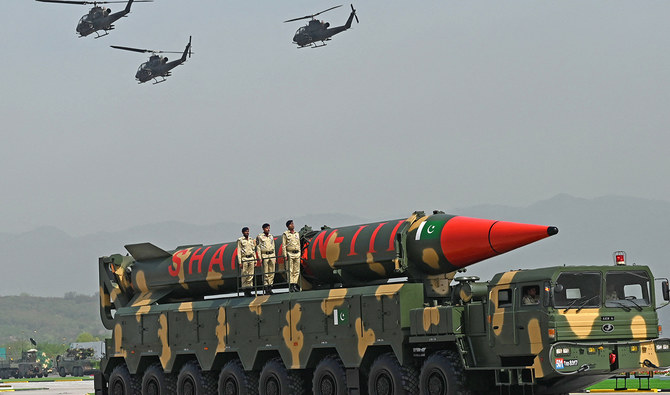
- US State Department announces sanctions against three Chinese companies and one based in Belarus
- State Department says companies supplied missile-applicable items to Pakistan’s ballistic, long-range missile programs
ISLAMABAD: The US State Department announced this week it has imposed sanctions on three Chinese companies and one Belarus-based company for supplying items to Pakistan’s ballistic missile program.
As per a press release, the State Department announced sanctions against China-based companies Xi’an Longde Technology Development Company Limited, Tianjin Creative Source International Trade Co. Ltd, Granpect Company Limited and the Belarus-based Minsk Wheel Tractor Plant.
“These entities have supplied missile‐applicable items to Pakistan’s ballistic missile program, including its long-range missile program,” a press release issued late Friday stated.
The State Department said Minsk Wheel Tractor Plant had worked to supply special vehicle chassis to Pakistan’s long-range ballistic missile program.
“Such chassis are used as launch support equipment for ballistic missiles by Pakistan’s National Development Complex (NDC), which is responsible for the development of Missile Technology Control Regime Category (MTCR) I ballistic missiles,” it said.
Washington alleged Xi’an Longde Technology Development Company Limited supplied missile-related equipment, including a filament winding machine, to Pakistan’s long-range ballistic missile program that was also destined for NDC.
“Filament winding machines can be used to produce rocket motor cases,” the State Department said.
It said the Tianjin Creative Source International Trade Co. Ltd. supplied missile-related equipment to Pakistan’s long-range ballistic missile program, including stir welding equipment.
It said the company’s supplies were likely destined for Pakistan’s Space and Upper Atmosphere Research Commission (SUPARCO), which develops and produces Pakistan’s MTCR Category I ballistic missiles.
It further said Granpect Company Limited worked with SUPARCO to supply equipment for the testing of large-diameter rocket motors.
“In addition, Granpect Co. Ltd. also worked to supply equipment for testing large-diameter rocket motors to Pakistan’s NDC,” it added.
The sanctions mean all property and interests in property of the companies in the US or in possession or control of American citizens are blocked and must be reported to the US Treasury Department’s Office of Foreign Assets Control (OFAC), the State Department said.
They also mean that all transactions by American citizens, or those within (or transiting) the US that involve any property or interests in property of the companies, are prohibited unless authorized by a general or specific license issued by OFAC or exempt.
Pakistan has so far not responded to the US State Department’s action.
Pakistani pacer Mohammad Amir sets sights on T20 World Cup after comeback

- Amir played his first T20 international match for Pakistan on Thursday after a nearly four-year hiatus
- Pacer says he feels his body is fitter compared to 2019 when he last played for Pakistan in a World Cup
ISLAMABAD: Pakistani fast bowler Mohammad Amir said this week he has set his sights on the upcoming T20 World Cup 2024, as he gears up to mark his return to international cricket after a nearly four-year hiatus.
The 32-year-old pacer played his first match on Thursday against New Zealand in Rawalpindi but did not bowl a single delivery as rain suspended play during the first over of the match.
Amir, one of Pakistan’s most prolific fast bowlers, retired in December 2020 after being dropped from the side. He changed his mind last month and decided to restart his career, which had also been stalled by a spot-fixing ban in 2010.
“The way the Pakistan Cricket Board (PCB) management brought me back, it is for a short-term goal, the [T20] World Cup,” Amir told PCB Digital in an interview on Friday. “And that is the biggest goal.”
The left-arm pacer pointed out that Pakistan had played in the semifinal of the T20 World Cup 2021 and competed in the final of the T20 World Cup in 2022. However, it had failed to “cross the line” and become world champions on both occasions.
“If that happens [Pakistan win the World Cup] it would be a huge achievement for me, to be a part of that team,” he said.
Amir said he feels he is much fitter compared to 2019 when he last represented Pakistan in a World Cup tournament.
“See, you cannot express yourself properly in the ground until you’re fit,” he said. “So I feel the way my body feels fresh right now, I can chip in more and prove beneficial to the team via my performance.”
The pacer credited his wife and children for helping him stay positive.
“She makes sure that all my focus is on cricket,” he said. “I think that always gives me energy and helps me to face whatever I have to.”
Pakistan face New Zealand in the second T20 fixture of the five-match series in Rawalpindi today, Saturday. The two sides will lock horns in Rawalpindi on April 21 before meeting for the remaining two fixtures in Lahore on April 25 and 27.
Teams:
Pakistan: Babar Azam (captain), Usman Khan, Abrar Ahmed, Iftikhar Ahmed, Mohammad Rizwan, Mohammad Amir, Muhammad Irfan Khan, Naseem Shah, Saim Ayub, Shadab Khan, Shaheen Shah Afridi
New Zealand: Michael Bracewell (captain), Mark Chapman, Josh Clarkson, Jacob Duffy, Dean Foxcroft, Ben Lister, Jimmy Neesham, Tim Robinson, Ben Sears, Tim Seifert, Ish Sodhi
Pakistan’s finmin discusses energy, tax reforms with senior World Bank official
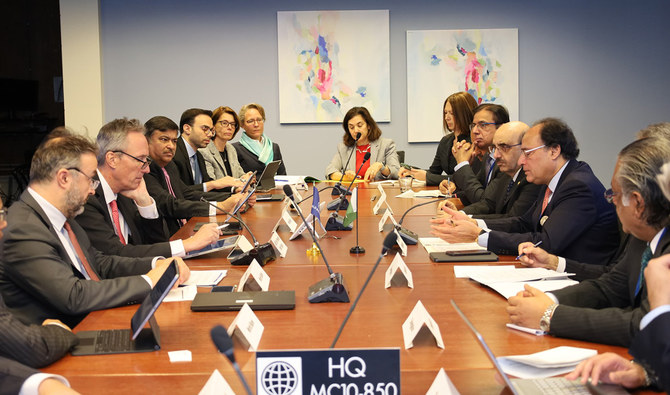
- Pakistan has vowed to broaden its tax base, reform energy sector and privatize loss-making state-owned entities
- Pakistan’s finance minister is in Washington to attend spring meetings by the International Monetary Fund, World Bank
KARACHI: Pakistan’s Finance Minister Muhammad Aurangzeb underlined the government’s resolve to carry out reforms in the energy and tax sectors in his meeting with a senior World Bank official this week, the finance ministry said on Saturday, as Islamabad grapples with an economic crisis amid surging inflation and low foreign exchange reserves.
Reeling from a macroeconomic crisis, Pakistan has assured international financial institutions and bilateral partners it would take concrete measures to broaden its tax base, carry out reforms in the energy sector and overhaul loss-making state-owned enterprises (SOEs).
Aurangzeb has been in Washington since last week to participate in spring meetings organized by the IMF and World Bank. His tour is an important one for the South Asian country as Pakistan’s ongoing nine-month, $3 billion loan program with the International Monetary Fund designed to tackle its balance-of-payments crisis, expires this month.
Aurangzeb met Martin Raiser, the World Bank’s regional vice president for South Asia, on Friday to discuss the government’s economic reforms.
“Underlined the reform thrust of the government in the areas of energy, tax reforms and SOEs,” the finance ministry said. “Informed that government was pursuing short and long-term goals in these sectors.”
Aurangzeb said the World Bank’s focus on climate change, digitalization and human development aligns with Islamabad’s priorities, highlighting the government’s vision to realize the country’s true potential for economic growth.
“Agreed on the need for reforms in the agriculture sector, water management and waste-water treatment,” the ministry said.
Aurangzeb met World Bank’s President Ajay Banga on Tuesday during which he spoke about the government’s reforms in tax and energy sectors and highlighted Pakistan’s progress on privatization of government entities.
In an interview on Monday, the Pakistani finance minister had said Islamabad would seek a fresh three-year IMF program, adding that the government plans to continue with necessary policy reforms to rein in deficits, build up reserves and manage soaring debt servicing.
In a separate statement, the finance ministry said Aurangzeb met China’s Finance Minister Lan Fo’an on Friday. During the exchange, the Pakistani finance chief thanked his Chinese counterpart for Beijing’s regular rollovers which helped plug Pakistan’s external financing gaps.
“Informed that Pakistan was entering into a larger and extended program with IMF and looked forward to the support of China,” the ministry said, adding that he highlighted the government’s economic reforms in various sectors during his meeting with the Chinese official.
Pakistan to train 1 million youth annually to export skilled human resource to Gulf countries
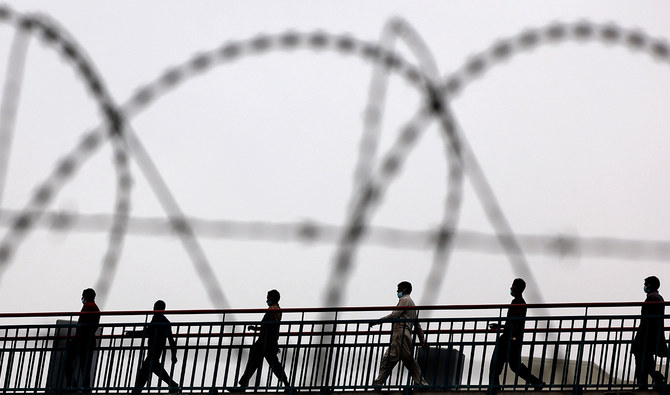
- Islamabad is planning to roll out a new education policy next month, with a focus on vocational training and out-of-school children
- Educationists, however, say the real challenge for the government is to ensure implementation of the policy, focus on teacher training
ISLAMABAD: Pakistan’s government is working on a new education policy to impart technical skills to one million youth annually to export trained human resource to Saudi Arabia and other Gulf countries, an official said on Friday.
The cash-strapped South Asian nation of 241 million has been working on a holistic national education policy to cover technical training for the youth by enrolling over 2.5 million out-of-school children.
The Special Investment Facilitation Council (SIFC), a federal body led by Prime Minister Shehbaz Sharif to attract investment from foreign and domestic sources, has given specific targets to the education ministry to finalize a comprehensive policy to improve the education sector.
“This new policy aims to impart vocational training to at least one million youth per annum to export skilled workforce to Saudi Arabia and other Gulf countries,” Rana Mujtaba, a spokesperson for the Pakistani ministry of education and professional training, told Arab News.
“It will be rolled out in May.”
There are around 9 million overseas Pakistanis living and working in different countries, including 2.8 million in Saudi Arabia, who remit around $30 billion back home annually to support the country’s fragile economy.
“Majority of our overseas workforce is unskilled labor. Therefore, the government is now focusing on enhancing vocational capacity of the youth,” Mujtaba said.
In the National Education Policy 2017-2025, Pakistan aimed to raise its literacy rate from the existing 60 percent to 90 percent by 2025, narrow down the gender gaps, reduce rural and urban imbalance, improve quality of education, promote technical and vocational education with skill development programs, and ensure good governance. But all this has yet to be achieved.
Mujtaba said Pakistan’s vocational training institutes already had a “strong affiliation” with Saudi Arabia, where all training certificates were accepted.
“The SIFC that is chaired by the PM has given a general direction to the ministry to work on a new education policy to improve the sector’s performance,” he said.
The spokesperson dispelled the notion that the education ministry was working on the new education policy without taking provincial governments on-board, since education has primarily been a provincial subject in the South Asian country.
“The federal government is in fact supporting the provinces in improving the education sector. All provincial ministers and education secretaries are on-board as the federal ministry has sought inputs from all of them,” he said.
“This will be a holistic policy that will also address the issue of out-of-school children, improving the higher education’s standards, domestic and foreign scholarships for the students.”
Educationists and public policy experts said the government had already devised numerous policies and produced documents to improve the education sector, but it would lack in implementation of these plans.
“The silver lining in the new policy is that the government is for the first time focusing on out-of-school children, but there needs to be an effective mechanism in place with clear timelines to address this issue,” Taimur Bandey, an educationist, told Arab News.
“The government needs to allocate its resources for teachers training and upgrade libraries and laboratories in the institutions to improve the education standards.”
Pakistani PM orders authorities to expedite anti-smuggling operations amid economic crisis
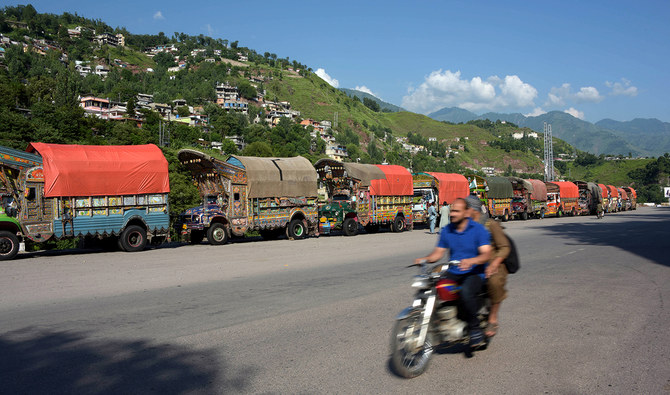
- PM Sharif chairs high-level meeting to review progress on countrywide anti-smuggling measures
- Orders effective monitoring of the Afghan transit trade, action against smugglers and hoarders
ISLAMABAD: Prime Minister Shehbaz Sharif ordered law enforcement agencies to expedite Pakistan’s nationwide anti-smuggling campaign, state-run media reported this week, as Islamabad tries to navigate a tricky path to economic recovery.
Pakistan’s caretaker administration announced a countrywide crackdown against smuggling and black marketing in September 2023 as the South Asian country reeled from an economic crisis that has seen its foreign exchange reserves plummet, currency devaluate sharply and inflation rise to record highs.
PM Sharif’s government has vowed to continue the country’s anti-smuggling operations to ensure Pakistan makes steady economic progress.
“Prime Minister Muhammad Shehbaz Sharif has directed the law enforcement agencies to expedite the countrywide anti-smuggling campaign,” the state-run Radio Pakistan reported on Friday. It said the development took place during a high-level meeting chaired by Sharif in Islamabad on Friday to review the anti-smuggling operations in the country.
In October last year, Pakistan imposed a 10 percent processing fee on several items imported from Afghanistan under a transit trade agreement to stop the illegal entry of goods from the country. In the meeting on Friday, Sharif ordered authorities to ensure effective monitoring of the Afghan transit trade items to prevent their smuggling.
“He directed the customs authorities to conduct a third-party audit of the system that monitors Afghan transit trade,” state-run media said.
Authorities told Sharif during the meeting that a list of smugglers, hoarders and their facilitators has been prepared and provided to law enforcement agencies and provinces.
The Pakistani prime minister appreciated law enforcement agencies for taking effective action against smuggling and ordered authorities to enhance cooperation to crack down on the illegal activities.



